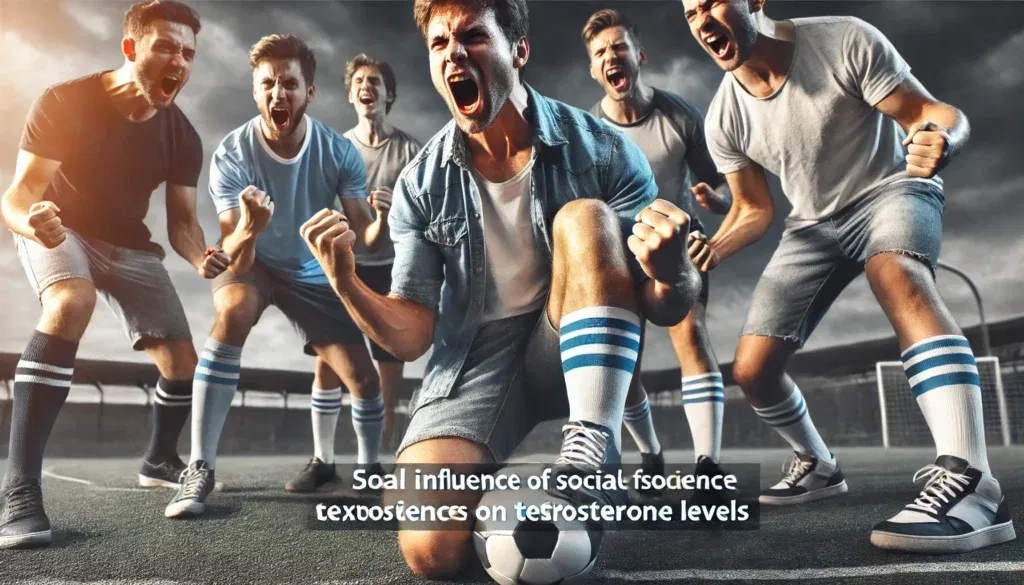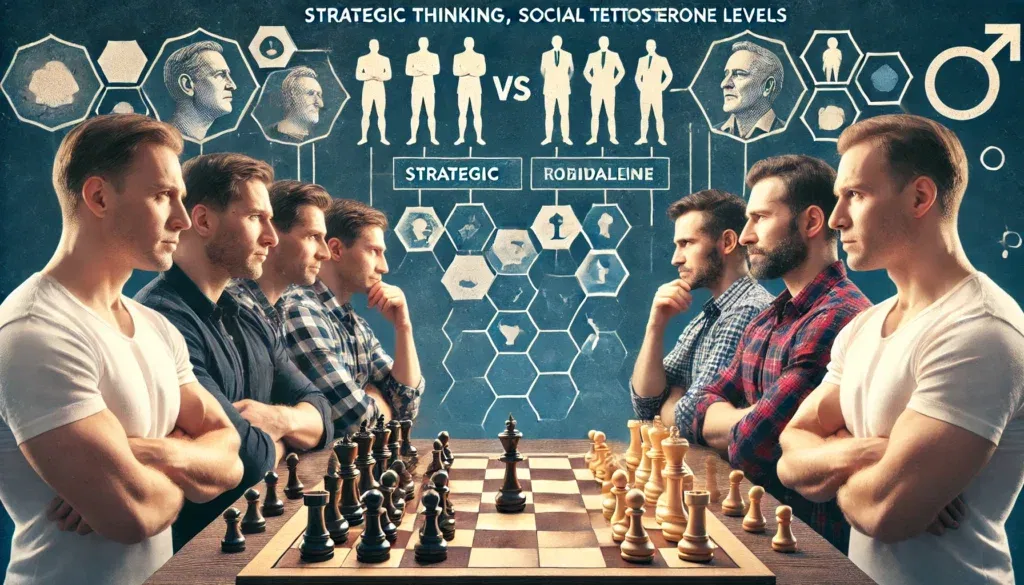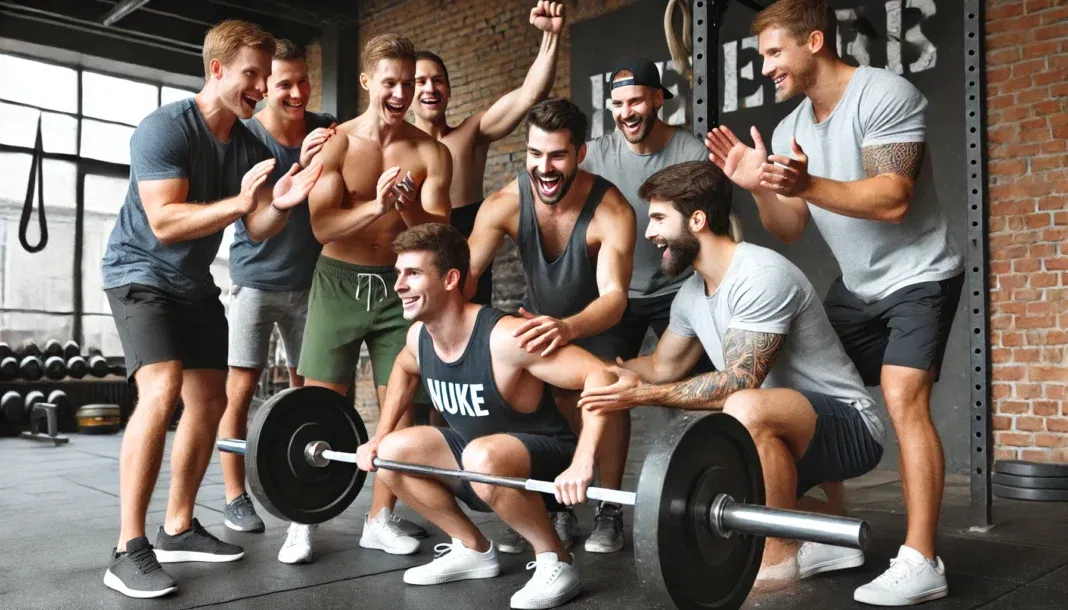The intricate relationship between social experiences and hormonal health has fascinated researchers for decades. Testosterone, a critical hormone influencing male health, mood, and behavior, is not solely determined by biological factors but is also deeply intertwined with environmental and social interactions. Recent studies have illuminated how social norms, competition, hierarchy, and interpersonal relationships impact testosterone levels. Understanding these dynamics sheds light on men’s overall well-being and provides insights into optimizing hormone health through social engagement.
You may also like: How to Get Your Testosterone Levels Checked: Best At-Home and Lab Testing Options
The Biological Role of Testosterone and Its Social Sensitivity
Testosterone is a key androgen hormone predominantly produced in the testes and regulated by the hypothalamic-pituitary-gonadal (HPG) axis. While commonly associated with traits like muscle growth, libido, and aggression, testosterone’s influence extends to cognitive function, emotional regulation, and risk-taking behaviors. However, its production and fluctuations are not static; rather, they are highly responsive to external stimuli, including social experiences.
Social interactions act as powerful mediators of hormonal shifts. Situations involving dominance contests, competition, and social validation can lead to transient spikes in testosterone levels. Conversely, social defeat, rejection, or prolonged isolation can suppress its production. The emerging field of social endocrinology explores these complex interplays, demonstrating how external experiences shape physiological responses. By understanding these influences, men can make informed choices about their social environments and behaviors to support optimal hormonal balance.

Social Competition and Testosterone Spikes
One of the most compelling insights from recent research is the link between competitive interactions and testosterone fluctuations. Competition, whether in sports, business, or social settings, can trigger significant hormonal responses. A study examining male athletes revealed that winners of competitive encounters experience a surge in testosterone, reinforcing dominance and confidence. This “winner effect” fosters continued engagement in competitive pursuits, whereas losing can result in a decline, potentially affecting mood and motivation.
The effects extend beyond formal competitions. Workplace dynamics, professional achievements, and even informal social challenges contribute to similar hormonal patterns. Men who perceive themselves as successful in their fields often exhibit higher baseline testosterone levels, which may enhance assertiveness and leadership qualities. On the other hand, repeated failures or workplace marginalization may contribute to suppressed testosterone production, reinforcing feelings of inadequacy.
Social Hierarchies and Their Hormonal Implications
Social hierarchies play a crucial role in shaping hormonal responses. Men who attain and maintain higher social status tend to have higher testosterone levels, while those in subordinate positions often exhibit lower levels. This phenomenon is evident in both primate studies and human social structures. The presence of a clear hierarchical ranking influences individual well-being, as perceived status impacts self-esteem, motivation, and physiological health.
A study on corporate executives demonstrated that those in leadership positions, particularly those with greater autonomy and decision-making power, had elevated testosterone levels compared to their subordinates. This hormonal advantage may contribute to their confidence, risk-taking tendencies, and ability to navigate complex social landscapes. Conversely, men who feel powerless or lack social influence often experience hormonal suppression, which can affect motivation, energy levels, and resilience to stress.
Social Support and Testosterone Regulation
While dominance and competition have clear links to testosterone levels, social support networks also play an essential role. Meaningful relationships, including friendships, romantic partnerships, and mentorships, provide emotional stability that influences hormonal regulation. Men in supportive social environments tend to maintain healthier testosterone levels, as emotional security mitigates stress-related hormonal fluctuations.
A study analyzing men in long-term relationships found that those with strong social bonds exhibited more stable testosterone levels compared to those experiencing social isolation. The presence of a reliable support system reduces cortisol, the stress hormone that can suppress testosterone production. Positive social interactions, whether through family, community engagement, or friendships, contribute to overall hormonal resilience.
The Impact of Social Defeat and Rejection on Testosterone
Not all social experiences positively influence testosterone. Instances of social defeat, rejection, or exclusion can significantly impact hormonal health. Psychological stressors, such as breakups, job loss, or social ostracization, often result in a sharp decline in testosterone levels. This effect is particularly pronounced in men who experience repeated social failures or who perceive themselves as lower in social standing.
Experimental studies examining social exclusion scenarios found that men who faced rejection exhibited lower testosterone levels in subsequent measurements. This hormonal response can exacerbate feelings of depression, anxiety, and low self-esteem. However, research also suggests that resilience-building activities, such as engaging in new social opportunities and developing adaptive coping mechanisms, can help restore hormonal balance over time.
Practical Strategies to Leverage Social Experiences for Hormonal Health
Understanding the impact of social experiences on testosterone opens the door to strategic lifestyle interventions. Men can optimize their hormonal health by actively engaging in social environments that foster confidence, support, and success. Strategies include:
- Participating in Competitive Activities: Engaging in sports, strategic games, or professional challenges can stimulate healthy testosterone levels, reinforcing confidence and motivation.
- Cultivating Leadership Roles: Whether in the workplace, community, or personal endeavors, taking on leadership responsibilities can enhance self-efficacy and hormonal balance.
- Building Strong Social Networks: Prioritizing meaningful relationships and seeking support from friends, mentors, and partners mitigates stress-related testosterone declines.
- Managing Social Defeats Constructively: Developing resilience through self-improvement, therapy, or new opportunities helps mitigate the hormonal consequences of rejection or failure.
- Balancing Assertiveness and Cooperation: While dominance can enhance testosterone, fostering cooperative and emotionally intelligent social interactions ensures sustained well-being.

Frequently Asked Questions (FAQ) on Social Factors and Testosterone
1. How do social experiences influence testosterone levels in men?
Social experiences play a crucial role in regulating testosterone levels. Studies indicate that engaging in competitive or dominant social situations can lead to a measurable increase in testosterone. For instance, participating in sports, public speaking, or even strategic business negotiations can stimulate a hormonal response. The social experiences spike testosterone study suggests that status-seeking behaviors, such as leadership roles, can further amplify these effects. Long-term exposure to dominant social roles may result in sustained hormonal adaptations that reinforce confidence and assertiveness.
2. What social factors are most likely to increase testosterone?
Several social factors can lead to an increase in testosterone levels. Competitive interactions, such as athletic performance or business leadership, have been shown to elevate testosterone. The social factors increase testosterone study highlights that even indirect competition, such as video gaming or stock trading, can influence hormonal balance. Additionally, social validation and recognition from peers can trigger a biochemical response. The presence of supportive social networks can also contribute to hormonal regulation by reducing stress-induced testosterone suppression.
3. How do social norms affect testosterone fluctuations?
Social norms dictate behavioral expectations, which in turn influence testosterone regulation. The social norms testosterone study explores how cultural expectations surrounding masculinity and dominance can impact hormonal activity. In societies where assertiveness and competitiveness are highly valued, individuals may experience more frequent testosterone surges. Conversely, in cultures that prioritize collectivism and emotional restraint, testosterone fluctuations may be less pronounced. Understanding these cultural influences can help individuals optimize their social interactions for hormonal balance.
4. Can social experiences increase testosterone even without physical activity?
Yes, social interactions alone can elevate testosterone levels without requiring physical exertion. The social experiences increase testosterone study reveals that activities like negotiation, public debate, or leadership meetings can stimulate the endocrine system. Engaging in intellectually stimulating and socially dominant roles can enhance confidence, leading to biochemical changes. Even online social interactions, such as social media debates or competitive gaming, can trigger a hormonal response. This highlights the significant impact of psychological engagement on endocrine function.
5. How do different types of social interactions affect testosterone levels?
Various social interactions impact testosterone levels differently. Positive social encounters, such as achieving a goal or receiving praise, can elevate testosterone and reinforce motivation. On the other hand, negative social experiences, such as public rejection or failure, may lead to a temporary drop in testosterone. The social experiences spike testosterone study suggests that interactions involving competition or hierarchical dominance produce the most significant hormonal shifts. Understanding these dynamics can help individuals navigate social settings to maintain hormonal balance.
6. Does testosterone influence social behavior, or is it the other way around?
Testosterone and social behavior influence each other in a cyclical manner. Elevated testosterone levels can lead to increased dominance-seeking behavior, assertiveness, and risk-taking. However, social experiences also regulate testosterone production, as seen in the social factors increase testosterone study. This bidirectional relationship suggests that individuals can actively shape their hormonal profile through strategic social engagement. Developing social confidence and assertiveness may naturally encourage a hormonal environment that reinforces these traits.
7. Can social stress lower testosterone levels?
Yes, chronic social stress can suppress testosterone production. Prolonged exposure to social anxiety, workplace pressure, or interpersonal conflicts can elevate cortisol, which inhibits testosterone synthesis. The social norms testosterone study emphasizes that societies with high expectations of social conformity may create stress that impacts hormonal balance. Engaging in stress-reducing activities and maintaining a supportive social circle can help counteract these effects. Managing stress is essential for optimizing testosterone levels and overall well-being.
8. How do social hierarchies impact testosterone levels?
Social hierarchies play a significant role in testosterone regulation. Individuals in leadership positions or dominant roles tend to have higher baseline testosterone levels. The social factors increase testosterone study indicates that ascending in a social hierarchy through achievements or recognition can lead to sustained hormonal increases. Conversely, individuals in subordinate positions may experience lower testosterone due to stress and limited opportunities for dominance expression. Recognizing and strategically navigating social structures can help individuals optimize their hormonal profile.
9. Is there a difference in testosterone response between introverts and extroverts?
Personality traits influence testosterone responses to social interactions. Extroverts, who seek out social engagement and competitive situations, often experience more frequent testosterone spikes. The social experiences increase testosterone study suggests that introverts may have a more moderate hormonal response but can still benefit from targeted social challenges. While extroverts may thrive in group dynamics, introverts can optimize their testosterone levels through one-on-one interactions or intellectual competitions. Understanding personality-based responses can help tailor social strategies for hormonal balance.
10. Can manipulating social experiences be used as a strategy to enhance testosterone naturally?
Yes, intentionally engaging in testosterone-boosting social experiences can be an effective natural strategy. The social experiences spike testosterone study highlights that adopting dominant roles, seeking out competitive challenges, and engaging in high-status behaviors can lead to hormonal optimization. Practicing confident body language, public speaking, and leadership activities can also contribute to increased testosterone levels. By actively shaping social interactions, individuals can create an environment that naturally supports hormonal health. This approach provides a non-invasive, lifestyle-based method to enhance testosterone regulation.

Final Thoughts: Social Experiences as a Key to Hormonal Balance
The intricate relationship between social experiences and testosterone levels underscores the dynamic nature of men’s hormone health. By acknowledging the profound impact of social interactions—whether in competitive environments, hierarchical structures, or supportive relationships—men can take proactive steps to optimize their hormonal balance. Embracing social opportunities that foster confidence, status, and connection can lead to improved well-being, resilience, and long-term health benefits. As emerging research continues to illuminate these connections, integrating social engagement into holistic health strategies offers a powerful approach to sustaining vitality and hormonal equilibrium.
testosterone health benefits, hormone balance strategies, social competition effects, male hormonal well-being, testosterone and confidence, workplace stress hormones, hormone health optimization, social support hormone regulation, dominance and testosterone, competitive activities for men, resilience and testosterone, social status impact on health, hierarchy and male hormones, testosterone levels and success, male well-being strategies, friendship and hormone health, sports and testosterone spikes, workplace hierarchy testosterone, social engagement and well-being, rejection hormone effects
Further Reading:
The role of testosterone in social interaction
Testosterone release and social context: when it occurs and why
TESTOSTERONE AND SOCIAL ISOLATION INFLUENCE ADULT NEUROGENESIS IN THE DENTATE GYRUS OF MALE RATS
Disclaimer: The information provided in this article is for general informational purposes only. The content does not constitute professional advice of any kind, including but not limited to medical, legal, or financial advice. HisHealthMag and its contributors make no representations or warranties regarding the accuracy, completeness, or reliability of the information presented. Always seek the advice of a qualified professional for any specific concerns or questions you may have. Neither HisHealthMag nor its authors assume any responsibility or liability for any actions taken based on the information provided in this article. The views and opinions expressed are those of the author(s) and do not necessarily reflect the official policy or position of HisHealthMag.





